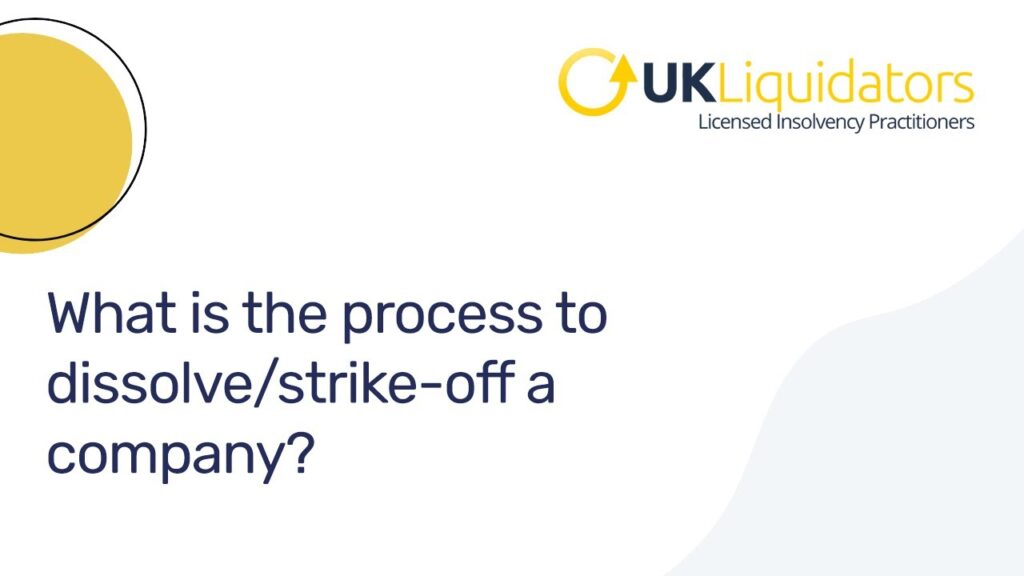Comprehensive Insights into Compulsory Strike Off Procedures
Wiki Article
A Comprehensive Guide to the Compulsory Strike Off Procedure in Corporate Governance
The compulsory strike off procedure, a crucial component in company administration, offers as a device to apply conformity and preserve the honesty of the service environment. As companies advance and conditions adjustment, the demand to strike off a business might emerge for different factors.
Factors for Compulsory Strike Off
What scenarios cause the necessity of a required strike off in corporate administration? There are numerous essential reasons that might prompt the initiation of an obligatory strike off procedure for a business. One common scenario is when a business fails to abide by its legal responsibilities, such as submitting yearly returns or financial declarations to the pertinent authorities. Non-compliance with governing requirements can increase problems concerning the firm's procedures and monetary wellness, leading to the choice to strike off the company from the register.In addition, companies that have actually ceased trading or are no more bring out any business activities may additionally encounter compulsory strike off. This could be due to insolvency, mergers, or merely a choice to wind up the firm. In such instances, maintaining the firm on the register would serve no function and could possibly produce complication among stakeholders.
Inevitably, the need of a compulsory strike off in corporate administration occurs when a firm is no much longer operating based on the regulation or has ended up being inoperative, necessitating its removal from the authorities records.
Legal Effects and Dangers
Offered the scenarios that motivate a compulsory strike off in company administration, it is essential to comprehend the lawful ramifications and risks linked with such activities. When a firm is struck off the main register, it ceases to exist as a legal entity.Moreover, there are legal repercussions for individuals associated with the monitoring of a business that has actually been by force struck off. They might be invalidated from functioning as directors in the future, face penalties, and even imprisonment if misconduct or fraudulent tasks are revealed. Furthermore, the reputational damages from a compulsory strike off can have lasting results on people and their capability to engage in future service ventures. Comprehending these legal implications and dangers is vital for all stakeholders included in the business governance procedure to make sure and navigate potential mistakes compliance with the regulation.
Steps in the Strike Off Refine
Initiating the compulsory strike off procedure in company administration entails a collection of prescribed steps detailed by governing authorities. The initial step normally calls for the firm to send an official application or alert to the pertinent government agency or registrar signaling its intent to be struck off the main register. Subsequently, the company is often required to resolve any type of exceptional responsibilities, debts, or tax obligations to guarantee conformity with governing requirements.Once the initial documents is sent and economic commitments are satisfied, the governing body will certainly publish a notice in a comparable publication or the official gazette to educate stakeholders regarding the approaching strike off - compulsory strike off. This notice serves as a final chance for any type of interested events to elevate arguments or present legitimate reasons why the company should not be dissolved
Complying with the magazine of the notification, the regulative authority will continue with the strike off process if no significant objections or barriers occur. The firm will then be officially dissolved, and its name will certainly be eliminated from the register, properly noting the verdict of the mandatory strike off treatment in business administration.
Papers Required for Strike Off
In conformity with governing standards, specific documentation must be given to facilitate the strike off procedure in corporate governance. The called for papers typically include a formal application for strike off, which requires to be completed precisely and sent to the pertinent regulatory authority. In addition, monetary statements, such as the company's latest equilibrium sheet, should be consisted of to guarantee that all monetary obligations have been cleared up before starting the strike off treatment. A statement of solvency or a declaration confirming that the business has no superior obligations is commonly mandated to demonstrate that the entity can be dissolved without creating damage to its financial institutions. Furthermore, any required approvals from investors or board members ought to be documented and enclosed with the application. It is necessary to make certain that all the requisite paperwork is meticulously prepared and sent according to the recommended guidelines to speed up the strike off process successfully. Failing to offer the necessary documents may result in delays or difficulties in the dissolution of the company.Post-Strike Off Considerations and obligations
Complying with the completion of the essential documents for strike off, focus changes to the post-strike off responsibilities and considerations that are crucial in the company governance procedure. Once a business has actually been struck off the register, it is essential to make sure that all staying assets are dealt with suitably.
Final Thought
Finally, the mandatory strike off treatment in company governance works as a required mechanism to remove defunct business from the register. Understanding the factors, legal implications, actions, and papers required for strike off is crucial for compliance with regulatory requirements. It is essential for business to accomplish their post-strike off obligations and consider the ramifications of this procedure in order to preserve excellent standing and avoid possible risks.
There are several key factors that may trigger the initiation of a compulsory strike off treatment for a business (first gazette notice). Non-compliance with regulatory demands can raise issues about the firm's operations and economic health and wellness, leading to the decision to strike off the firm from the register

Report this wiki page